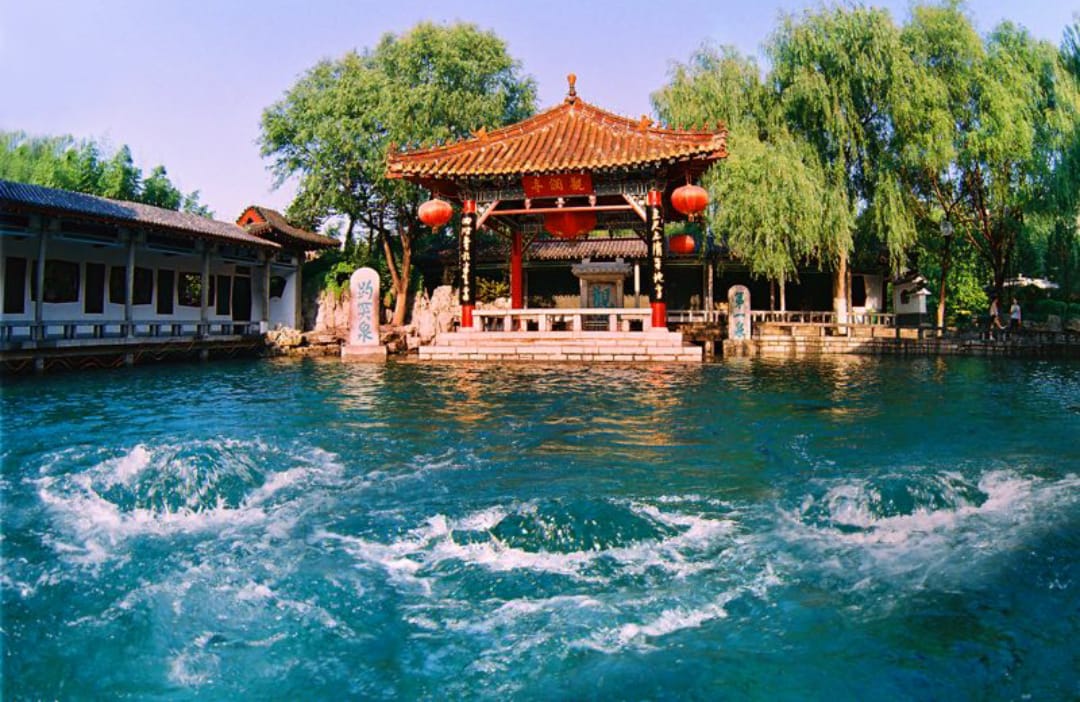
- Emperor Qianlong declared Jinan tea ‘Finest Spring Under Heavens’
- Baotu Spring water remains at 18C in all four seasons
JINAN, China – Jinan, capital of Shandong Province in East China, is an economic and cultural hub covering 10,244 square kilometers with a population of 10.87 million people. The city is known for its well-preserved ecological environment and has won titles such as “National Forestry City” and “National Garden City”. The City also clinched “National Water Eco-Civilization City” title – the first of its kind in China.

Taishan Mountain stands tall to the south of Jinan, with the Yellow River to its north. Jinan is also a city energized by springs. It has more than 800 springs, including 72 famous ones such as Baotu Spring, Black Tiger Spring, Moquan Spring and Shuyu Spring.
Baotu Spring Park is located in the center of Jinan. It was built in 1956 and covers 10.5 hectares of land. It has cultural parks of many springs, especially Baotu Spring, whose fame is globally recognized. It has more than 3,500 years of history.
When Emperor Qianlong (1711-1799) visited Jinan, he drank tea made of spring water. The aroma and taste impressed him and he called it “The Finest Spring Under Heavens”. The story of his trip has been engraved on a stone beside the spring.
The source of Baotu Spring is at the front of Luoyuan Hall in the Park. The spring rushes out from the underground Karst Cave, with a daily amount of 70,000 cubic meters flowing out of the cave. The spring has three outlet ports, whose water inflow reaches an utmost 162,000 meters per day.
The temperature of Baotu Spring water remains at 18C in four seasons. It was named among the top three attraction of Jinan, together with the Qianfo Mountain and Daming Lake. In 2013, the spring was listed a national 5A level attraction.
Black Tiger Spring is located below a steep cliff in Lixia district of Jinan. The water laps the hills, whose sound is like a tiger’s growl, that’s how it got its name. It’s in a natural cave with a height of 2 meters at a depth of 3 meters and a width of 1.7 meters. The spring pool is made from stone 17 meters wide and 3 meters deep.
There are three tiger-head stone carvings on the southern wall. The water inflow reaches an utmost 41,000cum per day, less only than Baotu Spring. There are 14 springs surrounding Black Tiger Spring.
Jinan city is also home to Daming Lake, the only lake in the world that is formed by springs. The city also has the only moat formed by springs. In June 2019, the cultural landscape of springs in Jinan was included in the tentative list of Chinese World Heritage Sites.

Daming Lake is located in Lixia district of Jinan, and is formed by numerous springs in the city. The water is clear and the tress, lotus, pavilions and terraces around make it a pleasant landscape. It has an area of 58 hectares.
The average water depth is 2 meters. It’s also a world-renowned tourist scenic spot. The lake was first recorded 1,400 years ago in a book of Li Daoyuan, a geologist of the Northern Wei Dynasty (386-534). Du Fu, a famous poet from the Tang Dynasty (618-907) visited the lake twice and wrote about it in his poems.
Tie Baoyi, a calligrapher from the Qing Dynasty (1644-1911) also praised the beauty of the lake in his works. The Lixia Pavilion, a wooden building, is located on a small island at the center of the lake. Its horizontal inscribed board was written by Emperor Qianlong (1711-1799).
Jinan has established economic and commercial exchanges with some 190 countries and regions. Over 1,000 foreign-invested companies operate in the city which has also had investment from 129 Fortune Global 500 enterprises. In 2018, the export and import value of the city was 93.6 billion yuan ($13.25 billion) and foreign investment was 17.89 billion yuan.
Jinan also contributed to the Belt and Road Initiative by opening numerous rail routes linking Europe and Asia. Jinan Yaoqiang International Airport has routes flying to some 100 domestic and overseas cities. The passenger throughput was 16.61 million in 2018, and cargo throughput was 110,000 metric tons. Jinan has 75 sister cities around the world.
Jinan is experiencing dynamic industrial development. As a key area for cultivating new engines of growth, the city is developing 10 industries valued at 100 billion yuan each, including big data and information technology, intelligent manufacturing and high-end equipment, medical care, biological medicine and quantum technology.
The GDP of Jinan reached 886.2 billion yuan in 2018 while its per capita GDP reached 101,900 RMB, making it a global second-tier city and a member of Asia’s top 50 cities.








